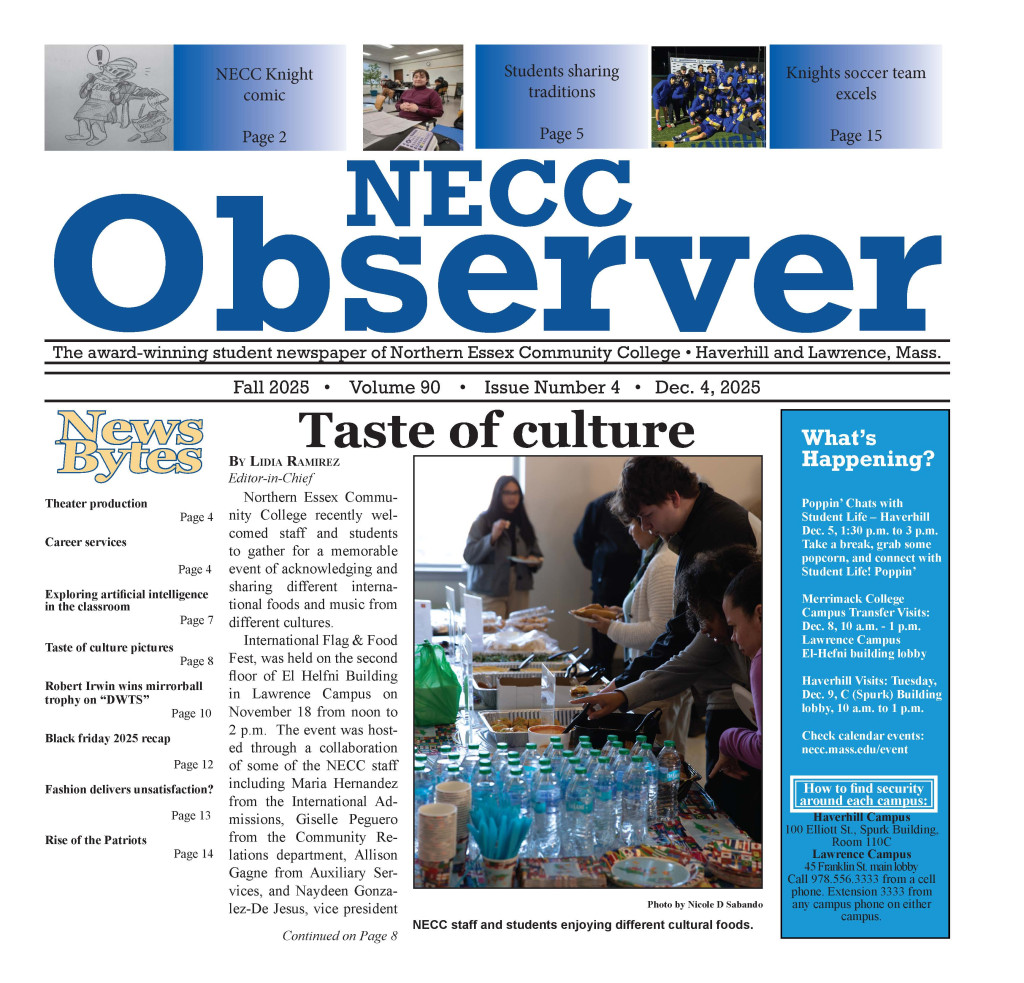Students speak on ways to improve life on campus
It is no question that Northern Essex is a diverse school. Not only does Northern Essex offer education to people of any age but to people of any background. Every semester, NECC gets a variety of students from around the world looking to pursue their academic journey. Because of Northern Essex’ unique campuses that are found in Haverhill and Lawrence MA, we are home to almost 50 percent of Hispanic/Latino students. A large population of these students make up the Lawrence campus, therefore allowing us to be one of three Hispanic-serving institutions in the state. A Hispanic-serving institution is a federal designation of a college where at least 25 percent of the student body is Latino. Stephanie Haskell and Analuz Garcia are two faculty members who are dedicated to making the campus a better place for its students. Haskell is the coordinator of student activities for leadership and social justice initiatives and Garcia is the assistant director of community and international relationships.
Both Haskell and Garcia are a part of Leading For Change Diversity Consortium. This group aims for retention of the Hispanic population at the school, therefore they look for ways to help the Latino population on both campuses. Their first initiative was to gather information from a variety of students to ask whether NECC should adopt the term Latinx. Garcia says, “In California this term is broadly used. We are concentrating on gathering data and figuring out, what are we going to do with this?” Haskell also suggested doing “different events for National Hispanic Heritage month in September.” A few students were asked about their knowledge about the Hispanic presence on campus and shared insightful feedback on what the school can do to improve its inclusivity. Danikza Carrasquillo, 21 year old Liberal Arts: Writing major shared that she was not aware that Hispanic and Latino students made up almost 50% percent of the school’s population, although she figured the number was high. Castillo also shared that although she didn’t necessarily know that NECC was considered a “Hispanic serving institution that she was aware that “there are a lot of benefits for Hispanic students at NECC.”
Castillo however did have a slight background on Leading For Change stating that she was aware of it being a “nonprofit organization that is designed to help students with training and resources.” She continued to share her opinion about representation on campus and said, “I personally think there is not enough Latin representation at least in the Haverhill campus. On the Lawrence campus you are able to see the diversity more. Honestly I believe it’s hard to represent the Latin culture in areas of school because some students don’t relate or plain and simple they don’t care. They don’t understand why it is important to dive into other cultures and learn from them.” Castillo offers advice to the Leading For Change faculty by suggesting more diverse activities, dances, and Hispanic women based lectures. She also suggests that “food is always a great way to get people together and talking” Finally she shared, “Create spaces for people to feel more inclined to share.” When asked about the Latinx term, she replied, “I’ve never liked any terms or labels, when we start labeling things we start organizing and creating groups that’s how we are separated. I like to leave my labels empty so that I approach people with a clean slate as I hope they would to me.”
Maryanne Rosado is a 20 year old Liberal Arts Major at Northern Essex and also shared her knowledge and opinions about Latino inclusivity. Rosado was not aware about the population, that NECC was Hispanic serving or the Leading For Change group. ‘I believe the majority of Hispanic and Latino students (are) in the Lawrence campus. The reason why I think there isn’t enough Latino representation in the school is because there isn’t enough Latino representation in the clubs.” Rosado goes on to say, “When the after school programs and governments demonstrate enough Latino students, I think there might be a change.” Rosado was aware of the term “Latinx” and expressed that she is OK with the term. “People have a right to what they want to identify with.”
After evaluating the data, Garcia and Haskell replied to the administration and concluded that they should “continue to use Hispanic or Latino/a to respect the preferences of the students and community.” They also included that they welcome any member of the college to use Latinx as a gender inclusive option. If you have any further suggestions or questions, contact Stephanie Haskell at shaskell@necc.mass.edu or Analuz Garcia at agarcia@necc.mass.edu

